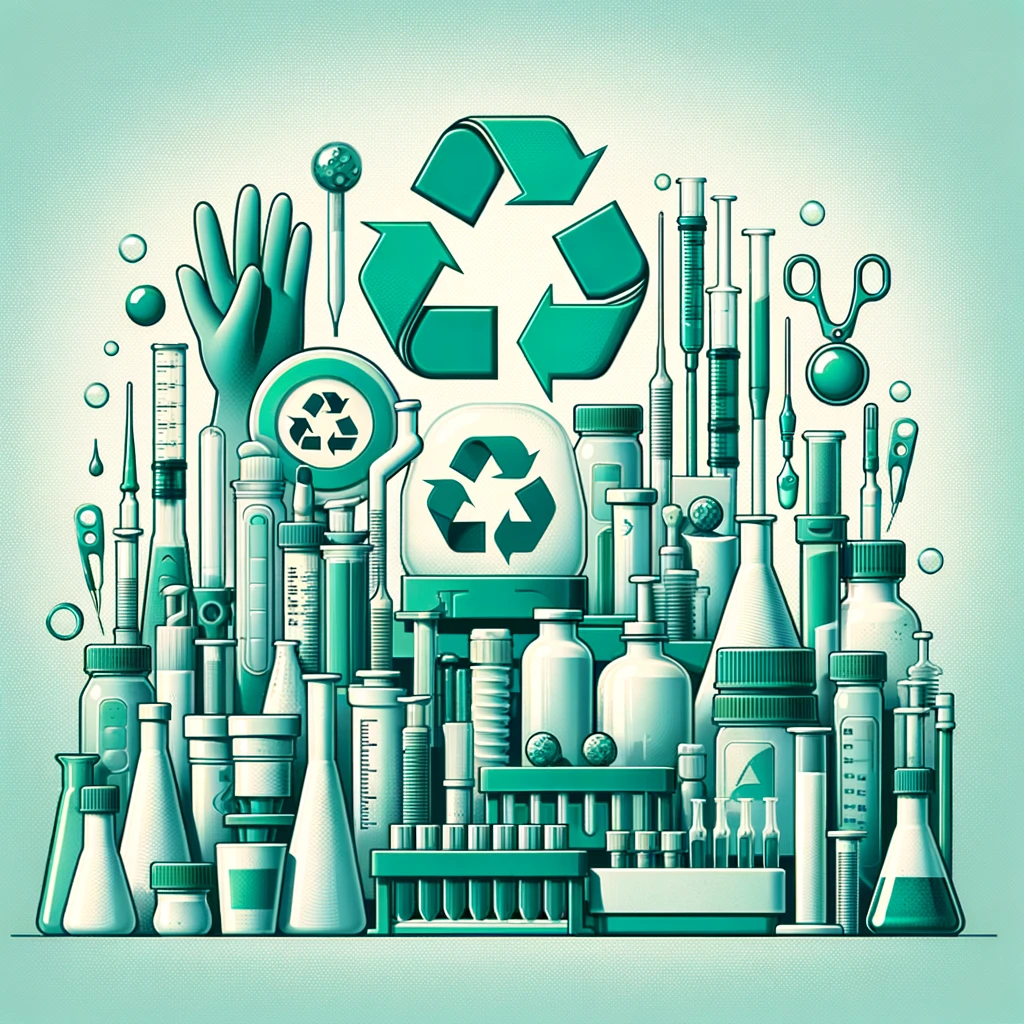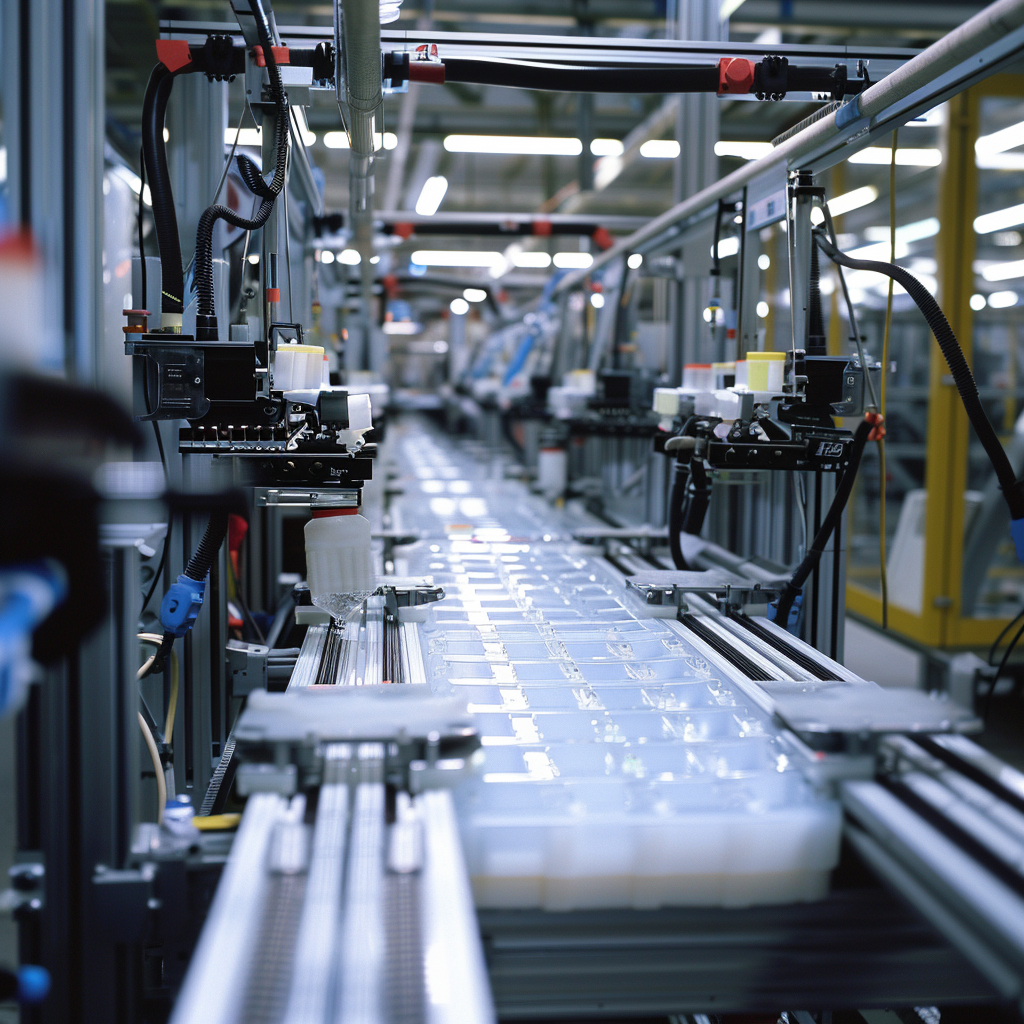
Research Recycling
Greenhouse Gas (GHG) emissions produced by the Lifecycle Stages of a Lab Plastic
produces 33-48% of overall emissions.

01
Polymer Production
Manufacturing Process
Produces 6-32% of overall emissions.

02
Disposal
Produces 26-55% of overall emissions.

03
Although Transportation and packaging are inherent in each stage, they are minor contributors to overall emissions.

Transportation
Produces ≤ 5% of overall emissions.

Packaging
Produces ≤ 5% of overall emissions.
8 Ibs
of lab plastic waste is generated by a scientist each day.
12 Billion Ibs
of lab plastic waste is generated each year.
60-80%
of lab plastic waste is either incinerated or landfilled.
20%
increase in lab plastic waste by 2030.
Plastic waste contributes to pollution, harms wildlife, and exacerbates climate change through the release of toxins and greenhouse gases.


Our Vision
Eliminate landfill and incineration of lab plastics by leveraging recycling technologies and integrating recycled materials back into manufacturing supply chains.
Emission Hotspots in the Lifecycle of Lab Consumables
Our Areas of Focus

Quantifying hazardous vs non-hazardous waste

Identifying barriers to sourcing raw materials

Conducting lifecycle assessments for common lab plastics

Identifying challenges to recycling lab plastics
Our Areas of Focus

Identifying Barriers to Sourcing Greener Raw Materials

Conducting cradle-to-grave Life Cycle Assessments for Common Lab Products

Identifying Challenges to Recycling Lab Plastics
Emission Hotspots in the Lifecycle of Lab Consumables
Our Areas of Focus
Dive Deeper
Click to learn more about challenges facing your industry, our current projects and recent advances.
Emission Hotspots in the Lifecycle of Lab Consumables
01

Polymer Production
produces 33-48% of overall emissions.
02

Manufacturing
produces 6-32% of overall emissions.
03

Disposal
produces 26-55% of overall emissions.

Transportation
produces ≤ 5% of overall emissions.

Disposal
produces ≤ 5% of overall emissions.
Polymer production and disposal produce the majority of lifetime emissions. Although Transportation and packaging are inherent in each stage, they are minor contributors to overall emissions.
Polymer production and disposal produce the majority of lifetime emissions. Although Transportation and packaging are inherent in each stage, they are minor contributors to overall emissions.
How You Can Help
Collaborate with industry leaders from various backgrounds. Share insights and work together to drive sustainable change.
01. Join our linkedin
Share your perspective on the challenges and solutions to reducing GHG emissions.
02. Participate in interviews
Take an active role in offering your expertise and guiding the project's direction.
03. Become an advisor
Your contributions will directly shape sustainable practices, aid in the creation of white papers, and inspire others.
04. impact and inspire
Emission Hotspots in the Lifecycle of Lab Consumables
Polymer production and disposal produce the majority of lifetime emissions. Although Transportation and packaging are inherent in each stage, they are minor contributors to overall emissions.
03
Manufacturing
produces ≤ 5% of overall emissions.
03
Manufacturing
produces ≤ 5% of overall emissions.
03
Manufacturing
produces ≤ 5% of overall emissions.
Dive Deeper
Click to learn more about challenges facing your industry, our current projects and recent advances.

Lab supply procurement

Environmental health & Safety

Waste management
Dive Deeper
Click to learn more about challenges facing your industry, our current projects and recent advances.

MANUFACTURERS

Lab Supply Procurement

Environmental Health and Safety

Waste Management
Research Recycling
From inception to disposal
© 2024 by Research Recycling.
01

Polymer Production
produces 33-48% of overall emissions.
02

Manufacturing
produces 6-32% of overall emissions.
03

Disposal
produces 26-55% of overall emissions.
Polymer production and disposal produce the majority of lifetime emissions. Although Transportation and packaging are inherent in each stage, they are minor contributors to overall emissions.

Transportation
Produces ≤ 5% of overall emissions.

Packaging
Produces ≤ 5% of overall emissions.
Dive Deeper
Click to learn more about challenges facing your industry, our current projects and recent advances.
How You Can Help
01
Join our LinkedIn
Collaborate with industry leaders from various backgrounds. Share insights and work together to drive sustainable change.
02
Participate in Interviews
Share your perspective on the challenges and solutions to reducing GHG emissions.
03
Become an Advisor
Take an active role in offering your expertise and guiding the project's direction.
04
Impact and Inspire
Your contributions will directly shape sustainable practices, aid in the creation of white papers, and inspire others.

Barriers to Sourcing Greener Raw Material
Item Title Two
Item Title Three
8 Ibs
of lab plastic waste is generated by a scientist each day.
12 Billion Ibs
of lab plastic waste is generated each year.
60-80%
of lab plastic waste is either incinerated or landfilled.
20%
increase in lab plastic waste by 2030.
Plastic waste contributes to pollution, harms wildlife, and exacerbates climate change through the release of toxins and greenhouse gases.
Recent Posts

Meet Star Scott!
We’re excited to highlight Star Scott, the Green Labs Program Manager at The University of Georgia and a board member of I2SL: International Institute for Sustainable Laboratories.

Sitting down with Isobel Filipova
Founder of Product Sustainability by Devign

Spotlight on Colin Francis!
Co-Founder of LabCycle, the first solution to create a circular economy for single-use plastic waste from BSL 1 and 2 labs

Highlighting Noah Pyles!
Co-Founder and leading the charge at Polycarbin.

Spotlight on Craig Jeter!
Director of Solid Waste for the City of Baltimore!

Meet Matt Georgov!
A Trailblazer in Sustainable Waste Management!

Meet Danielle Stephens!
CEO and Founder of RecycleLab, a company closing the loop on lab plastic waste!

Be a Part of the Solution

Polymer Production
Produces 33-48% of overall emissions.
01

Manufacturing
produces 6-32% of overall emissions.
02

Disposal
produces 26-55% of overall emissions.
03
POLYMER PRODUCTION AND DISPOSAL PRODUCE THE MAJORITY OF LIFETIME EMISSIONS.

Transportation
Produces ≤ 5% of overall emissions.














